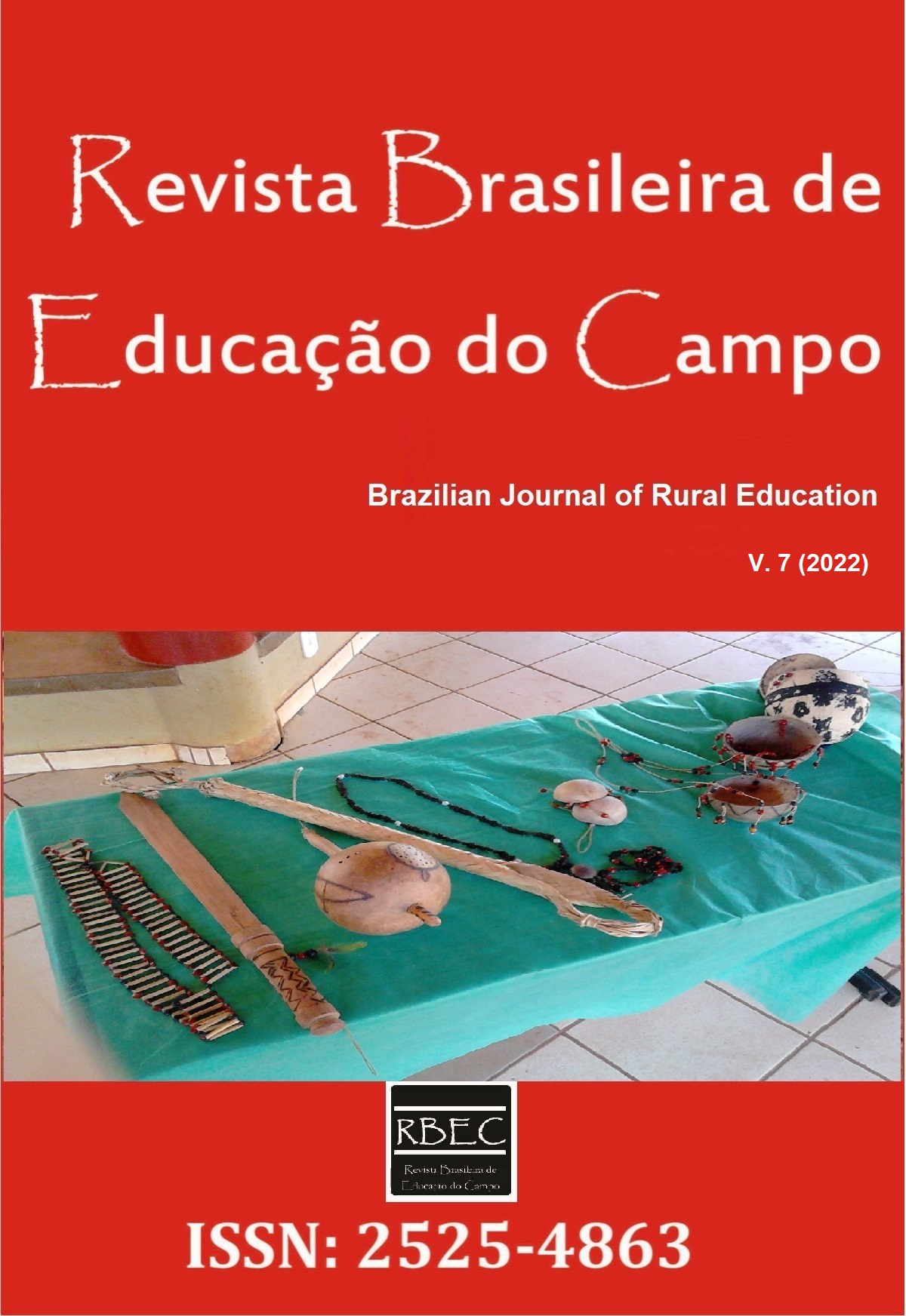Historical process of creation of the Santo Antônio Settlement in Porto Nacional-TO: a historical reading through rural education
DOI :
https://doi.org/10.20873/uft.rbec.e13904Résumé
ABSTRACT. In this work we will approach the historical process of regularization of the Santo Antônio Settlement – located in the municipality of Porto Nacional-TO – and the creation of the Municipal Education Center of Campo Chico Mendes. In order to do so, we will make a brief exposition on the performance of the National Institute of Colonization and Agrarian Reform (INCRA) in the national land reorganization, the settlement policies in the Fernando Henrique Cardoso Government and in the Government of Luiz Inácio Lula da Silva. We will also expose the issue of citizenship and the main social movements that have established links with Agrarian reform. Finally, we will present the historical process of creation of the Santo Antônio settlement, the physical structure and the Political Project of the Chico Mendes School. We consider that it is extremely important to understand how the creation of this settlement took place because, in addition to being one of the oldest settlements in the municipality of Tocantins, this study may offer subsidies so that teachers can use this study to discuss the History of the Settlement.
Téléchargements
Références
Albuquerque, V. O. (2006). Reforma agrária no governo Lula: uma análise do II Plano Nacional de Reforma Agrária (Dissertação de mestrado). Universidade Estadual Paulista, São Paulo.
Alentejano, P. R. R. (2004). A política de assentamentos rurais do governo FHC e os desafios da reforma agrária no Brasil do século XXI. Agrária, 1(1), 2-15. https://doi.org/10.11606/issn.1808-1150.v0i1p2-15
Caldart, R. (2000). Pedagogia do Movimento Sem Terra: escola é mais do que escola. Petrópolis, RJ: Vozes.
Carvalho Filho, J. J. (1997). Reforma agrária: de eleições a eleições. Estudos Avançados, 11(31), 99-109. https://doi.org/10.1590/S0103-40141997000300006
Coelho, G. L. S. (2010). Marcha para o Oeste: entre a teoria e a prática (Dissertação de Mestrado). Universidade Federal de Goiás, Goiânia.
Costa, G. S. (1996). MLT: O Movimento de Luta pela Terra: Um movimento em movimento (Dissertação de Mestrado). Universidade Federal da Paraíba, João Pessoa.
Delgado, G. (2005). A Questão Agrária no Brasil, 1950-2003. In Jaccoud, L. (Org.). Questão Social e Políticas Sociais no Brasil Contemporâneo (pp. 51-90). Brasília: IPEA.
Fernandes, B. M. (2008). O MST e as reformas agrárias do Brasil. Boletim DATALUTA, 9(24), 73-85.
Marchetti, F., Marques, P. E. M., Santos, J. D., & Silva, F. O. C. (2020). Caminhos da reforma agrária no Brasil e suas implicações para a agrobiodiversidade. Estudos Sociedade e Agricultura, (28), 254-311. https://doi.org/10.36920/esa-v28n2-2
Martins, J. S. (2003). A reforma agrária no segundo mandato de Fernando Henrique Cardoso. Tempo Social, 15(2), 141-175. https://doi.org/10.1590/S0103-20702003000200006
Mechi, P. S. (2015). Modernização excludente e conflito social na região do Tocantins nas décadas de 1970 e 1980. Textos e Debates, (25), 117-201. https://doi.org/10.18227/2217-1448ted.v1i25.2779
Medeiros, L. S. (2021). Instituto nacional de colonização e reforma agrária (INCRA). Rio de Janeiro: CPDOC-FGV.
Mello, M. A. et al. (2003). Educação formal e os desafios para a formação de uma nova geração de agricultores. In XLI Congresso da Sober (pp. 1-14). Juiz de Fora, MG.
Moreira, R. (1986). O plano nacional de reforma agrária em questão. Associação dos Geógrafos Brasileiros, 1(1), 6-19.
Oliveira, A. U. (2001). A longa marcha do campesinato brasileiro: movimentos sociais, conflitos e Reforma Agrária. Estudos Avançados, 15(43), 185-206. https://doi.org/10.1590/S0103-40142001000300015
Penna, C., & Rosa, M. C. (2015). Estado, movimentos e reforma agrária no Brasil: reflexões a partir do Incra. Lua Nova, 57-86. https://doi.org/10.1590/0102-6445057-085/95
Ramos, C. (2011). CONTAG: distantes abordagens e base social. Anais do XXVI Simpósio Nacional de História–ANPUH (1-14). São Paulo, SP.
Ribeiro, M. M. C. (2009). Modelos de reforma agrária: evasão e permanência em assentamentos rurais no Estado do Tocantins (Dissertação de Mestrado). Universidade Federal de Viçosa, Viçosa.
Rodrigues, A. C. S. et al. (2017). Reforma agrária no estado do Tocantins, embasamento histórico e atual na microrregião. Ciência Agrícola, (15), 19-22. https://doi.org/10.28998/rca.v15i0.3714
Santos, R. O. C. (2011). O que teve de reforma agrária no governo Lula? Revista Campo-Território, 6(12), 63-78
Silva, J. G. (1985). Reforma Agrária. E agora Brasil?, 1(4), 34-37.
Silva, M. P. N. S., & Miranda, R. S., Rodrigues, A. B. (2012). A questão agrária brasileira revisitada. Revista Verde de Agroecologia e Desenvolvimento Sustentável, 7(1), 48-54.
Téléchargements
Publié-e
Comment citer
Numéro
Rubrique
Licence
Proposal for Copyright Notice Creative Commons
1. Policy Proposal to Open Access Journals
Authors who publish with this journal agree to the following terms:
A. Authors retain copyright and grant the journal right of first publication with the work simultaneously licensed under the Creative Commons Attribution License that allows sharing the work with recognition of its initial publication in this journal.
B. Authors are able to take on additional contracts separately, non-exclusive distribution of the version of the paper published in this journal (ex .: publish in institutional repository or as a book), with an acknowledgment of its initial publication in this journal.
C. Authors are permitted and encouraged to post their work online (eg .: in institutional repositories or on their website) at any point before or during the editorial process, as it can lead to productive exchanges, as well as increase the impact and the citation of published work (See the Effect of Open Access).














